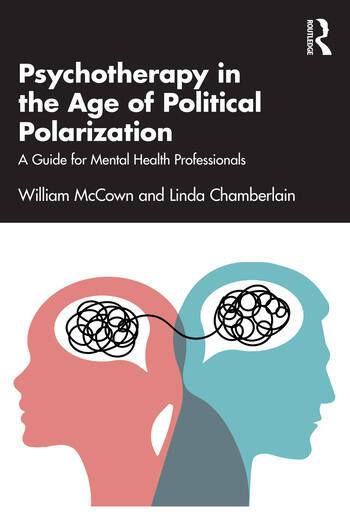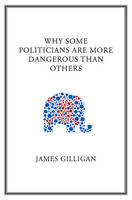Psychotherapy in the Age of Political Polarization: A Guide for Mental Health Professionals

Book Details
- Publisher : Routledge
- Published : April 2025
- Cover : Paperback
- Pages : 236
- Category :
Psychotherapy and Politics - Catalogue No : 98027
- ISBN 13 : 9781032651125
- ISBN 10 : 1032651121
Also by Linda L. Chamberlain
There are currently no reviews
Be the first to review
Psychotherapy in the Age of Political Polarization is a response to the challenge so many mental health professionals face: How do we best assist our clients who are suffering from the political polarization that is pervasive in our culture? This book explores how highly politicized interactions can often affect psychotherapy and counseling, and ways to combat the division.
The liberal/conservative division that exists in psychotherapy is discussed, and ways of overcoming these differences to work on a common goal in a therapeutic setting is of central importance. Useful case examples and vignettes are included to aid and mend divisions caused when encountering politically and ideologically challenging clients. Furthermore, the book explores how we’ve become so divided, the relevance of politics in therapy, the interface of political polarization with psychological disorders, and finally skills to aid mental health professionals in ethical practice.
This is an essential read for mental health professionals and students, including psychotherapists, counselors, and psychologists hoping to bridge the gap and reduce the negative impact of political polarization.
Reviews and Endorsements
Psychotherapy in the Age of Political Polarization: A Guide for Mental Health Professionals is a timely must-read for mental health students and professionals seeking to better understand the contemporary political and social influences on the lives of our clients.
Zander Keig, NASW, Social Worker of the Year (2020)
This book addresses a serious issue in the mental health field. Conservatives have a difficult time finding a therapist they can trust. In other contexts, therapists have come to understand that they must be knowledgeable and sensitive to the beliefs and values of their clients. It is time to recognize this is also true of political orientation.
Paul Norris, LMFT, associate director Braver Angels debate program
Politics, and the political strife that characterizes contemporary American society, inform clients’ sense of identity, belongingness, and psychological safety. Our clients inevitably bring political issues to the consulting room, not merely as opinions, but as crucibles for defining their world-view and their sense of place and purpose in society. The inherent tension between the fundamental human need for interpersonal connection, versus the rampant and worsening alienation and fragmentation in the body politic, endangers well-being at all levels — family, neighborhood, community, workplace. Drs. McCown and Chamberlain courageously take on a delicate task: bringing solid research perspectives to bear to illuminate an ethically sensitive and clinically meaningful approach to these issues, with the therapeutic mission and the well-being of the client always in the foreground. This is timely and valuable work, especially but not only for early career clinicians and those in training.
Jonathan Richard, Ph.D., clinical psychologist
William McCown and Linda Chamberlain brilliantly elucidate how the emotional and psychological impact of deep political divisions may become reflected within the therapy relationship. Demonstrating how political views are deeply rooted in people's identities and values, they further illustrate how disagreements can fracture the therapeutic alliance, create a breach of trust, or lead to irreparable treatment ruptures. McCown and Chamberlain enrich our understanding of the political divide by offering information and skills that mental health professionals can incorporate into their practices, including the importance of empathy, non-judgment, communication skills, and fostering a deeper understanding of shared human experiences. The effects of extreme partisanship and its impact on treatment and relationships are certainly not taught to mental health professionals who inevitably encounter this phenomenon in their practices. Skillfully, sensitively, and intentionally, McCown and Chamberlain guide clinicians to approach rather than avoid or fear issues of political partisanship in their work. Psychotherapy in the Age of Political Polarization is a great learning source for any mental health clinician.
Mary Lamia, Ph.D, clincial psychologist, psychoanalsyt, professor, author
The authors stress a fundamental truth: Human beings are more alike than they are unalike, and thus, all have the foundational need to be emotionally healthy. These authors know the “social territory” and how to navigate the present terrain. They offer down-to-earth practical strategies on how to just that. The case studies help readers to visualize the effectiveness of these strategies and further demonstrate the authors’ collective expertise. A job well done!
Pamela Higgins Saulsberry, Ph.D, LCSW-BACS, professor Emeritus of social work, University of Louisiana at Monroe
Therapists can no longer afford to ignore the sequelae between race, gender, and politics particularly among those existing on the margins of American society (i.e., Blacks, Asians, women, children, LGBTQIA). Political polarization continues to negatively impact these groups at disproportionate rates on a local, state, and national scale. This book allows the reader(s) to engage in critical discourse about how these factors can inform their therapeutic practice and patient-counselor interactions. Each chapter offers the reader(s) how political polarization affects individuals, groups, and families across all human systems (e.g., micro, macro, and mezzo). I strongly recommend this book for practitioners concerned with learning practical ways and theoretical-based ways of achieving authentic communities with marginalized communities.
Raymond Adams, Ph.D, MSW, MPH, associate professor, Morgan State University School of Social Work, editor-in-chief of Social Work in Public Health
Table of Contents
1. The Great Divide
2. Left and Right: Models of Liberal and Conservative Differences
3. Political to Partisan: How We Got Here
4. The Question of Liberal Bliss in Mental Health Professionals
5. Politics Invades the Therapy Space
6. Empathy in Counseling the Politicized Client
7. Partisanship and Grief
8. Complex Mental Health Disorders and Political Partisanship
9. Politics, Substance Abuse, and Addictive Behaviors
10. Working with Political Polarization in Relationships and Families
11. Depolarization, Training, and Support
12. Ethics and Advoacy
Appendix A: Political Orientation and Therapeutic Outcomes
Appendix B: Resources for Information Engagement, Training and Support
Index
About the Author(s)
William McCown, PhD, is a psychologist and Professor at the University of Louisiana Monroe, where he has taught for over 30 years.
Linda L. Chamberlain, Psy.D., is a Licensed Psychologist in private practice and professor of Human Services at Pasco-Hernando State College in New Port Richey, Florida.
Customer Reviews
Our customers have not yet reviewed this title. Be the first add your own review for this title.
You may also like
Unconscious Politics: Alienation, Social Science and Psychoanalysis
R.D. Hinshelwood
Price £26.09
save £2.90









